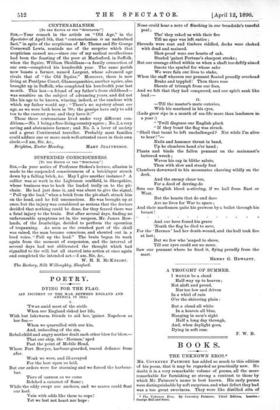CENTENARIANISM.
lTo ma EDITOR or THE " BPSCTATOR."] Sin,—Your remark in the article on "Old Age," in the Spectator of April 5th, that " centenarianism is an undoubted fact," in spite of the scepticism of Mr. Thorns and Sir George Cornewall Lewis, reminds me of the surprise which that scepticism caused me,—since one of my earliest recollections had been the feasting of the poor at Marlesford, in Suffolk, when the Squire, William Shuldham—a family connection of our own—completed his hundredth year. The same parish now boasts a farmer, named Largent, whose advanced age rivals that of "the Old Squire." Moreover, there is now living at Pentlyne Court, Glamorganshire, another squire, also brought up in Suffolk, who completed his hundredth year last month. This last—a friend of my father's from childhood— was sensitive on the subject of advancing years, and did not like his age to be known, wincing, indeed, at the candour with which my father would say "There's no mystery about our age, as we were both born in '90; the gossips have only to add ten to the current year, and they have it !"
These three centenarians lived under very different con- ditions,—No. 1 being a free-living country squire ; No. 2, a very saving and abstemious farmer; and No. 3, a lover of society and a great Continental traveller. Probably most families could adduce one or more such well-attested cases in their own circle.—I am, Sir, &c.,


































 Previous page
Previous page